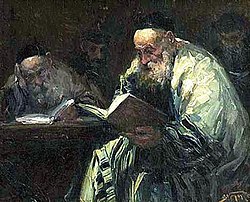Introduction
Joab appears in the Mishnah as the ideal general. [1] He and David supplemented each other; he would not have succeeded in his wars without David's continuous study of the Torah, and David would not have been able to apply himself to his ideal pursuits without such a reliable general as Joab. [2]
His generosity is indicated by the words "his house in the wilderness" (I Kings 2:34), which are meant that his house was as free as the wilderness, that it was open to everybody to find there food of all kinds, like a wilderness, it was free from robbery. [3] Rabbi Johanan even declared that Joab was not guilty of Abner's death, but that he brought him before the Sanhedrin, which, in the gate of the city (compare Deuteronomy 16:18), condemned Abner for killing Asahel. [4] When Joab had smitten the male children of Edom, David inquired why he had done so; Joab answered, "It is written, 'Thou shalt blot out the males (zachar) of Amalek'" (Deuteronomy 25:19). David retorted, "But it is zecher ("remembrance"), not zachar!" Joab replied that his teacher had made him read zachar. [5]
Joab struggled hard but vainly to dissuade David from numbering the people. Joab made two numberings, a complete and an incomplete one. He intended to render the incomplete numbering; if David became angry, he would give him the complete one. [6] After Joab had fled to the Tabernacle, he was brought before the judges for trial. Declared not guilty of the murder of Abner, as he had only avenged the blood of his brother Asahel, [7] he was condemned for the murder of Amasa; to Joab's defense that Amasa was a traitor because he had failed to execute David's order (compare II Samuel 20:4-5), the judges objected that Amasa, being occupied with the study of the Law, was not bound to execute the king's order. [8] When Benaiah went to execute Joab the latter said: "Let not Solomon condemn me to a double punishment; let him either kill me and take on himself the curses which his father uttered against me [II Samuel 3:29] or let me live and suffer from the curses only."
Solomon took on himself the curses, all of which were fulfilled in his descendants. [9] The Talmudists disagree as to whether Joab left a son or not, as some identify the Joab of Ezra 8:9 with the general of David. [10]
Midrashim
In various midrashim Joab is the subject of a number of hero-tales. Once, hearing David repeat, "Like as a father pitieth his children" (Psalms 103:13), Joab objected that a mother had more pity for her children than a father. David suggested that he should more carefully observe the dispositions of parents toward their children, and to do this, Joab undertook a journey. He arrived at the house of a poor old laborer who had twelve sons and who worked very hard to support his family. In the evening the old man divided the bread which he had won by his day's labor into fourteen equal pieces, for his twelve sons, his wife, and himself. On the following day Joab said to the old man: "You are old and feeble; why do you work for your young sons? Take my advice and sell one of them; and with the money you will be able to live with your family in comfort." The old man rebuked him for such advice and went on to his work; from the mother, however, he succeeded, after meeting many objections, in buying one son for one hundred pieces of gold. In the evening Joab, himself unseen, observed what passed between the father and the mother. The former, having noticed that one of the fourteen pieces of bread remained untouched, asked after his son. His wife at first gave various reasons for his absence, but her husband remained unsatisfied, and she was obliged to tell him the truth. The man took the money, and, having found Joab, demanded the return of his son. As Joab resisted, the man threatened to kill him unless he restored his son to him, which Joab gladly did, and acknowledged that David was right. [11]
Siege of Kinsali
At the head of 12,000 warriors Joab besieged Kinsali, or Ḳinsari, the capital of the Amalekites. After a fruitless siege of six months Joab's men despaired and desired to return to their homes. But Joab, having supplied himself with money, and taking his sword, ordered them to hurl him over the wall from a sling and wait forty days; if at the end of that time they saw blood flowing under the gates they would know that he was alive. His order was executed, and he fell in the yard of a house where lived a widow and her married daughter. Joab was taken and revived by its inmates, meeting their questions by telling them "I am an Amalekite; the Israelites captured me and threw me over the wall; now let me stay with you and I will pay you." At the end of ten days Joab went into one of the 140 streets of the city, entered a smith's shop, and ordered the smith to make a sword like the one which he had, but which was broken. The first two which the smith made Joab shook and broke, but the third one stood the test. Joab asked the blacksmith who should be killed with such a sword, and the answer was "Joab." With the words "Suppose I am Joab" he slew the smith. Then Joab went into the principal street, killed 500 mercenaries whom he met, and returned to the house. In the city it was rumored that Asmodai had killed the mercenaries; when Joab was asked whether he had heard of it he said he had not. Joab paid his hostess for ten more days, and at the end of that time went to the gate of the city, where he slew 1,500 men. This time his hand stuck to the sword, and he returned to the house and asked the young woman for warm water. But she said to him, "You eat and drink in our house and go out to kill our people!" Joab thereupon ran her through with his sword, after which his hand was healed. He then went into the street, killed every one he met on his way to the gates, slew the guard and threw open the gates. The Israelites had seen the blood flowing under the gates and shouted for joy. After ordering them to send for David, Joab climbed onto a tower in order that all might see him, and then saw the twentieth Psalm written on his right foot. Joab slew all the people of the city except the king, whom he left for David himself to kill. Then Joab put the slain king's crown on David's head while his troops were engaged in carrying off the spoils of the city. [12]

Absalom was the third son of David, King of Israel with Maacah, daughter of Talmai, King of Geshur.
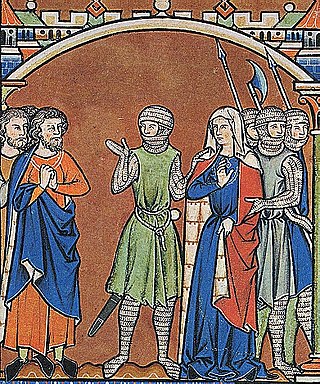
In the Hebrew Bible, Abner was the cousin of King Saul and the commander-in-chief of his army. His name also appears as אבינר בן נר "Abiner son of Ner", where the longer form Abiner means "my father is Ner".

The Book of Samuel is a book in the Hebrew Bible, found as two books in the Old Testament. The book is part of the Deuteronomistic history, a series of books that constitute a theological history of the Israelites and that aim to explain God's law for Israel under the guidance of the prophets.
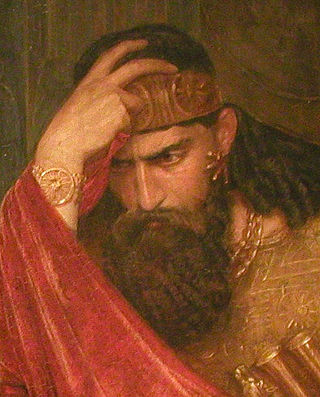
Saul was, according to the Hebrew Bible, the first monarch of the United Kingdom of Israel. His reign, traditionally placed in the late 11th century BC, supposedly marked the transition of Israel and Judah from a scattered tribal society ruled by various judges to organized statehood.

Agag is a Northwest Semitic name or title applied to a biblical king. It has been suggested that "Agag" was a dynastic name of the kings of Amalek, just as Pharaoh was used as a dynastic name for the ancient Egyptians. The etymology is uncertain, according to John L. McKenzie (1995), while Cox (1884) suggested "High."

Amasa (עמשא) or Amessai is a person mentioned in the Hebrew Bible. His mother was Abigail, a sister of King David. Hence, Amasa was a nephew of David, and cousin of Joab, David's military commander, as well as a cousin of Absalom, David's son. David calls him "my bone and my flesh". Amasa's father was Jether who was also called Ithra. Jether had dual-nationality, being an Ishmaelite and Israelite, although it might be a case of an assimilated Ishmaelite living in Israel.

Joab the son of Zeruiah, was the nephew of King David and the commander of his army, according to the Hebrew Bible.
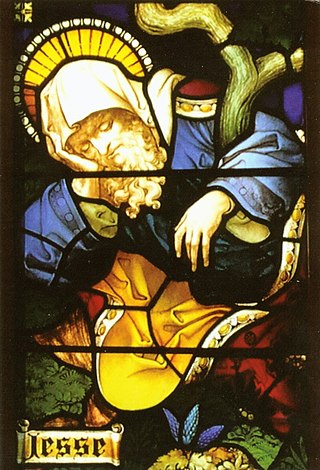
Jesse or Yishai is a figure described in the Hebrew Bible as the father of David, who became the king of the Israelites. His son David is sometimes called simply "Son of Jesse". The role as both father of King David and ancestor of Jesus has been used in various depictions in art, e.g. as the Tree of Jesse or in hymns like "Lo, how a rose e'er blooming."

Uriah the Hittite is a minor figure in the Hebrew Bible, mentioned in the Books of Samuel, an elite soldier in the army of David, king of Israel and Judah, and the husband of Bathsheba, the daughter of Eliam. While Uriah was serving in David's army abroad, David, from the roof of his palace, looked down on his city and spied upon Bathsheba bathing in the privacy of her courtyard. Moved by lust at the sight of her, David called for Bathsheba to be brought to him and slept with her, impregnating her. In an effort to hide his misdeeds, David called Uriah home from war, hoping that he and Bathsheba would have sex and that he would be able to pass the child off as belonging to Uriah. However, Uriah, being a disciplined soldier, refused to visit his wife. So David murdered him by proxy by ordering all of Uriah's comrades to abandon him in the midst of battle, so that he ended up getting killed by an opposing army. Following Uriah's death, David took Bathsheba as his eighth wife.
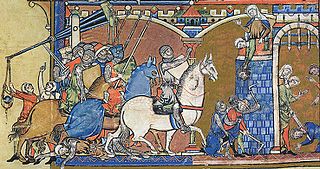
In the Old Testament, Sheba was a Benjaminite leader who revolted against King David, recounted in 2 Samuel.
Doeg was an Edomite, chief herdsman to Saul, King of Israel. He is mentioned in the Hebrew Bible book of First Samuel, chapters 21 and 22, where he is depicted as an antagonist of David responsible for the deaths of a large number of priests.

Asahel was a military leader under King David and the youngest son of David's sister Zeruiah. Asahel thus was the nephew of David and the younger brother of David's general, Joab, Asahel is mentioned in 2 Samuel chapters 2 and 3.

Thou shalt not kill, You shall not murder or Do not murder (CSB), is a moral imperative included as one of the Ten Commandments in the Torah.
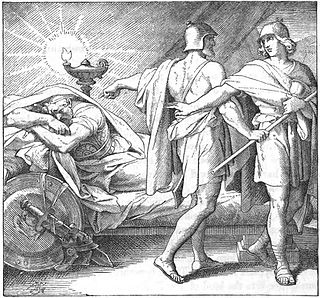
Abishai was a military leader under the biblical King David. He was the eldest son of David's sister Zeruiah. According to Josephus his father was called Suri. The meaning of his name is "Father of a gift". He was the brother of Joab and Asahel.

The Davidiad is the name of an heroic epic poem in Renaissance Latin by the Croatian national poet and Renaissance humanist Marko Marulić. Likely finished in AD 1517, the poem, as its Latin title suggests, details the ascension and deeds of David, the second king of the United Kingdom of Israel and Judah, who is said to have reigned c. 1010–970 BC.

2 Samuel 2 is the second chapter of the Second Book of Samuel in the Old Testament of the Christian Bible or the second part of Books of Samuel in the Hebrew Bible. According to Jewish tradition the book was attributed to the prophet Samuel, with additions by the prophets Gad and Nathan, but modern scholars view it as a composition of a number of independent texts of various ages from c. 630–540 BCE. This chapter contains the account of David becoming king over Judah in Hebron. This is within a section comprising 1 Samuel 16 to 2 Samuel 5 which records the rise of David as the king of Israel, and a section comprising 2 Samuel 2–8 which deals with the period when David set up his kingdom.

2 Samuel 3 is the third chapter of the Second Book of Samuel in the Old Testament of the Christian Bible or the second part of Books of Samuel in the Hebrew Bible. According to Jewish tradition the book was attributed to the prophet Samuel, with additions by the prophets Gad and Nathan, but modern scholars view it as a composition of a number of independent texts of various ages from c. 630–540 BCE. This chapter contains the account of David's reign in Hebron. This is within a section comprising 1 Samuel 16 to 2 Samuel 5 which records the rise of David as the king of Israel, and a section comprising 2 Samuel 2–8 which deals with the period when David set up his kingdom.

2 Samuel 4 is the fourth chapter of the Second Book of Samuel in the Old Testament of the Christian Bible or the second part of Books of Samuel in the Hebrew Bible. According to Jewish tradition the book was attributed to the prophet Samuel, with additions by the prophets Gad and Nathan, but modern scholars view it as a composition of a number of independent texts of various ages from c. 630–540 BCE. This chapter contains the account of David's reign in Hebron. This is within a section comprising 1 Samuel 16 to 2 Samuel 5 which records the rise of David as the king of Israel, and a section comprising 2 Samuel 2–8 which deals with the period when David set up his kingdom.

2 Samuel 20 is the twentieth chapter of the Second Book of Samuel in the Old Testament of the Christian Bible or the second part of Books of Samuel in the Hebrew Bible. According to Jewish tradition the book was attributed to the prophet Samuel, with additions by the prophets Gad and Nathan, but modern scholars view it as a composition of a number of independent texts of various ages from c. 630–540 BCE. This chapter contains the account of David's reign in Jerusalem. This is within a section comprising 2 Samuel 9–20 and continued to 1 Kings 1–2 which deal with the power struggles among David's sons to succeed David's throne until 'the kingdom was established in the hand of Solomon'.
War in the Hebrew Bible concerns any military engagement narrated or discussed in the Hebrew Bible, also known as the Tanakh or Old Testament of the Bible. Texts about war in the Hebrew Bible are part of the broader topic of The Bible and violence. They cover a wide range of topics from detailed battle reports including weapons and tactics used, numbers of combatants involved, and casualties experienced, to discussions of motives and justifications for war, the sacred and secular aspects of war, descriptions and considerations of what in modern times would be considered war crimes such as genocide or wartime sexual violence, and reflections on wars that have happened, or predictions, visions or imaginations of wars that are yet to come.
